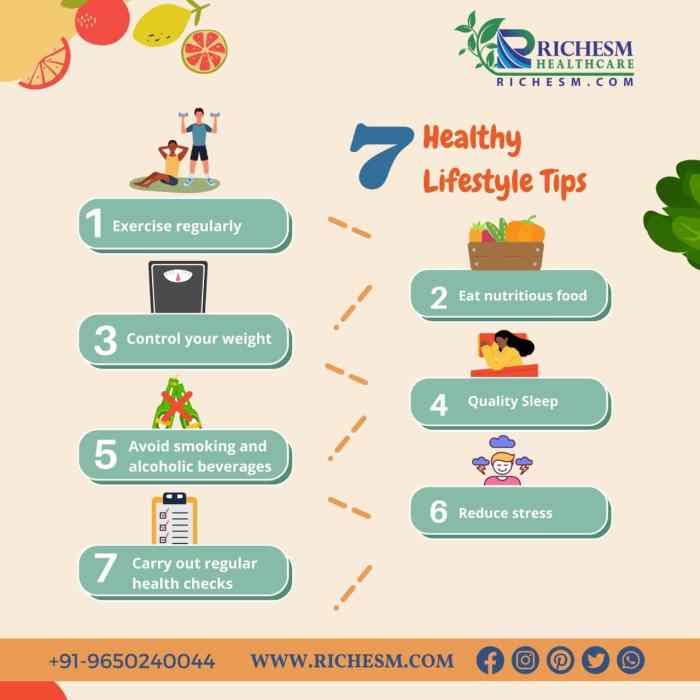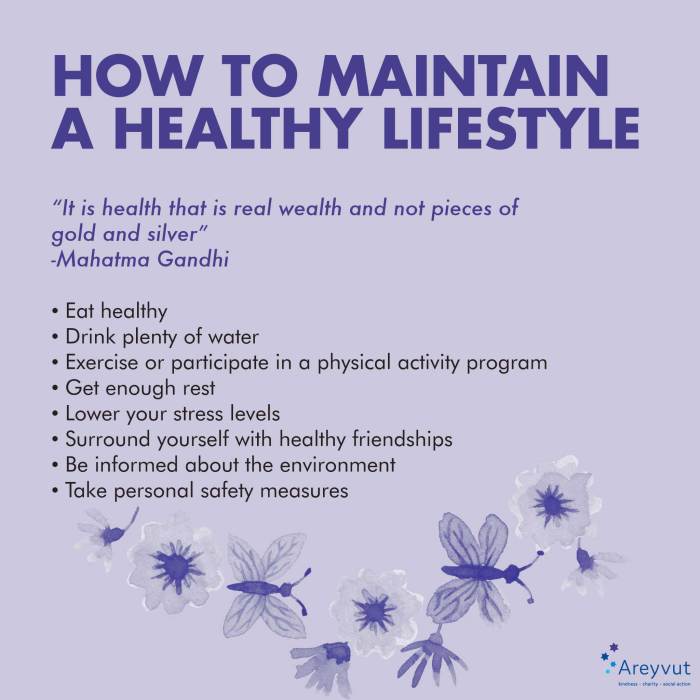Healthy Lifestyle Tips takes center stage as we dive into the world of wellness, packed with essential information to help you lead a healthier life. Get ready to boost your physical and mental well-being with these actionable tips!
Importance of Healthy Lifestyle: Healthy Lifestyle Tips
Maintaining a healthy lifestyle is crucial for overall well-being. By adopting healthy habits, individuals can experience improved physical and mental health, leading to a better quality of life. A healthy lifestyle can also help prevent various diseases and health conditions, reducing the risk of developing chronic illnesses such as heart disease, diabetes, and obesity.
Benefits of Healthy Habits
- Improved immune system function
- Increased energy levels
- Enhanced mood and mental clarity
- Better weight management
Prevention of Diseases
- Lower risk of heart disease and stroke
- Reduced chances of developing type 2 diabetes
- Decreased likelihood of obesity-related conditions
- Improved overall longevity and quality of life
Balanced Diet

Eating a balanced diet is essential for maintaining good health and overall well-being. A balanced diet includes a variety of nutrients that are necessary for the body to function properly.
Components of a Balanced Diet
A balanced diet should consist of fruits, vegetables, whole grains, lean proteins, and healthy fats. Each of these components plays a crucial role in providing the body with essential vitamins, minerals, and energy.
- Fruits: Fruits are rich in vitamins, minerals, and antioxidants that help boost the immune system and promote overall health. Examples include berries, citrus fruits, and apples.
- Vegetables: Vegetables are packed with fiber, vitamins, and minerals that support digestion and provide essential nutrients. Include a variety of colors like spinach, broccoli, and carrots.
- Whole Grains: Whole grains are an excellent source of fiber, which aids in digestion and helps regulate blood sugar levels. Some examples of whole grains are quinoa, brown rice, and oats.
- Lean Proteins: Lean proteins such as chicken, fish, tofu, and legumes are essential for muscle growth and repair. They also help keep you feeling full and satisfied.
- Healthy Fats: Healthy fats like avocados, nuts, seeds, and olive oil are important for brain function and heart health. They also help absorb fat-soluble vitamins.
Significance of Portion Control and Moderation, Healthy Lifestyle Tips
Maintaining a balanced diet also involves portion control and moderation. Eating the right portions of each food group helps prevent overeating and ensures that you are getting the nutrients your body needs without consuming excess calories.
Remember, it’s not just about what you eat, but how much you eat that matters.
Regular Exercise

Regular exercise is a crucial component of a healthy lifestyle, offering a wide range of benefits for both physical and mental well-being. By engaging in physical activity on a consistent basis, individuals can improve their overall health and quality of life.
Types of Exercises
- Cardiovascular Exercises: Activities like running, cycling, or swimming help improve heart health and increase stamina.
- Strength Training: Lifting weights or using resistance bands can build muscle mass and increase metabolism.
- Flexibility Exercises: Stretching and yoga help improve flexibility, reduce the risk of injuries, and promote relaxation.
Benefits of Exercise
- Weight Management: Regular physical activity helps burn calories and maintain a healthy weight.
- Cardiovascular Health: Exercise strengthens the heart, improves circulation, and reduces the risk of heart disease.
- Mood Boost: Physical activity releases endorphins, which can help reduce stress, anxiety, and improve overall mood.
Mental Well-being
Maintaining a healthy lifestyle goes beyond just physical health; it also encompasses mental well-being. The connection between mental health and a healthy lifestyle is crucial, as our mental state can greatly impact our overall quality of life.
Reducing Stress and Practicing Mindfulness
Stress is a common part of life, but excessive stress can take a toll on our mental health. To reduce stress, it’s important to find healthy coping mechanisms such as exercise, meditation, or engaging in hobbies. Practicing mindfulness, which involves focusing on the present moment without judgment, can also help in reducing stress and promoting emotional well-being.
Promoting Emotional Well-being
Emotional well-being is essential for a healthy mind. It’s important to prioritize self-care activities that bring joy and relaxation, such as spending time with loved ones, pursuing hobbies, or seeking professional help when needed. Building a strong support system and engaging in activities that promote positive emotions can significantly impact emotional well-being.
Adequate Sleep and Mental Health
Sleep plays a crucial role in mental health. Lack of sleep can lead to irritability, mood swings, and difficulty concentrating. It’s important to prioritize sleep hygiene by maintaining a consistent sleep schedule, creating a relaxing bedtime routine, and ensuring a comfortable sleep environment. Adequate sleep allows our brains to recharge and can improve overall mental well-being.